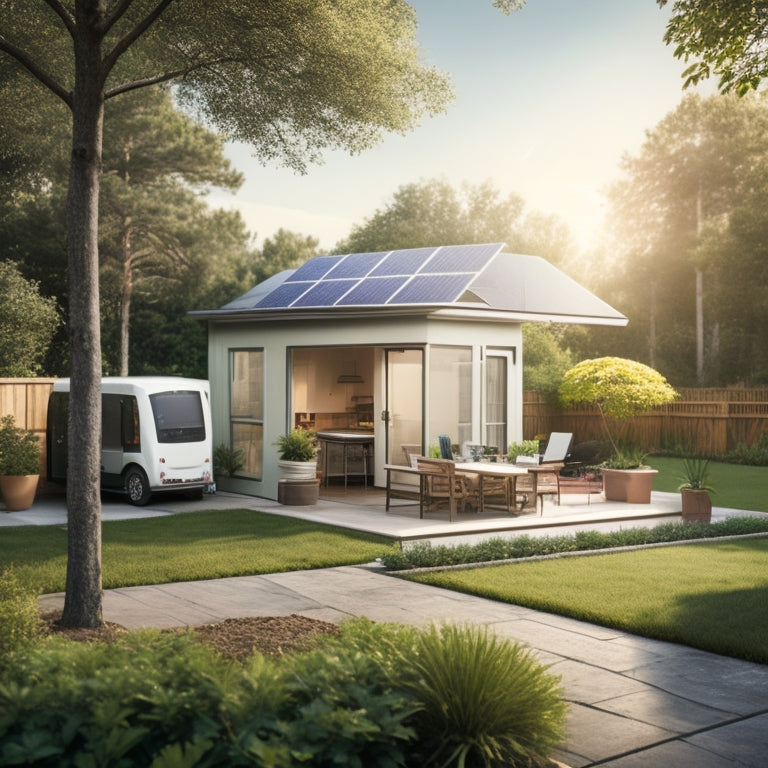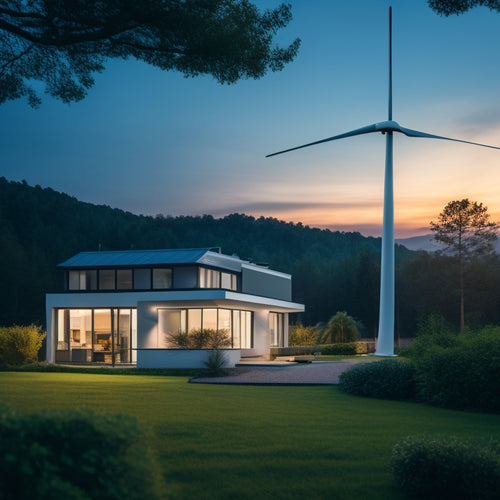
Top Appliances to Pair With Your Solar System
Share
When pairing appliances with your solar system, it's essential to prioritize energy efficiency and sustainability. Consider energy-efficient refrigerators from brands like Engel, Sundanzer, and Dometic, which offer DC-powered models ideal for off-grid systems. Front-loading washing machines and Energy Star-certified dishwashers can also greatly reduce energy consumption. Solar-powered water heaters, eco-friendly air conditioning units, and LED lighting solutions can further minimize your reliance on the grid. By selecting these compatible appliances, you'll not only reduce your energy bills but also contribute to a greener lifestyle. As you investigate these options, you'll uncover more ways to optimize your solar system's performance.
Key Takeaways
- Consider energy-efficient refrigerators with DC-powered models, high-quality insulation, and low-energy compressors for optimal solar system pairing.
- Choose energy-saving washing machines with front-loading technology and Energy Star certification to reduce water consumption and energy usage.
- Select solar-compatible dishwashers with advanced sensors and eco-friendly materials to minimize energy consumption and carbon footprint.
- Opt for eco-friendly air conditioning units with high EER and SEER ratings, and smart thermostats with remote control capabilities for energy efficiency.
- Switch to LED lighting, which significantly reduces energy consumption and utility bills, and is compatible with most solar-powered appliances.
Energy-Efficient Refrigerator Options
Efficiency is key when it comes to powering your solar system, and one of the most critical components is the refrigerator.
You'll want to choose a model with energy-efficient features that minimize energy consumption without sacrificing performance. Look for refrigerator brands like Engel, Sundanzer, and Dometic, which offer DC-powered models specifically designed for off-grid systems.
These units typically boast high-quality insulation, low-energy compressors, and optimized cooling systems. With the growing trend of transitioning to renewables, it's crucial to take into account the environmental impact of your appliance choices.
By selecting a refrigerator that aligns with your eco-friendly goals, you'll not only reduce your energy needs but also contribute to a more sustainable future.
When selecting a refrigerator, consider factors like capacity, voltage, and amp-hour ratings to guarantee compatibility with your solar system.
Solar-Powered Water Heater Solutions
As you've optimized your refrigerator's energy consumption, it's time to turn your attention to another critical component of your solar system: water heating.
Solar-powered water heaters offer an efficient and eco-friendly solution to reduce your energy reliance, similar to how electric vehicle charging stations can be customized for fleet needs.
Additionally, incorporating solar-powered water heaters can contribute to a cleaner, more sustainable energy sector.
You can choose from two primary solar heater types: direct circulation systems and indirect circulation systems.
Direct circulation systems pump water through solar collectors, while indirect systems use a heat exchanger to transfer heat to the water.
When selecting a solar water heater, consider installation factors such as roof size, insulation, and local building codes.
Proper installation will guarantee maximum energy harvesting and efficient water heating.
Eco-Friendly Air Conditioning Units
When shopping for eco-friendly air conditioning units, you'll want to look for models with high energy efficiency ratings, as they can greatly reduce your energy consumption.
In the summer, these units can provide reliable cooling solutions while minimizing your carbon footprint.
By shifting to green vehicles, such as electric vehicles, partner with charging network providers to guarantee a seamless integration with your solar system.
Energy Efficiency Ratings
Opt for air conditioning units with high energy efficiency ratings to minimize your solar system's energy consumption and reduce your carbon footprint.
When selecting a unit, look for the Energy Efficiency Ratio (EER) and Seasonal Energy Efficiency Ratio (SEER) ratings. These ratings indicate how efficiently the unit uses energy to cool your space. Higher ratings mean lower energy consumption and a smaller impact on the environment.
Regular cleaning and maintenance of essential components, such as air filters and radiators, guarantee safety on the road and reduce energy consumption.
Additionally, consider units made with sustainable materials that reduce waste and promote eco-friendliness.
Summer Cooling Solutions
Summer's sweltering heat demands a reliable cooling solution that won't compromise your commitment to sustainability. You need an eco-friendly air conditioning unit that works in harmony with your solar system.
Look for units with high energy efficiency ratings and features like inverter technology, which adjusts compressor speed to match cooling demands. Additionally, consider supplementing your AC with passive cooling methods, such as solar attic fans that use free energy from the sun to ventilate your attic space.
As you shift to renewable energy solutions, achieving energy independence becomes essential, and solar-powered EV charging stations can greatly reduce energy bills.
Moreover, investing in solar-powered EV charging mitigates rising energy costs, reduces risks associated with fossil fuel dependence, and locks in predictable energy costs for long-term competitiveness.
LED Lighting for Homes Explained
You're likely familiar with the benefits of energy-efficient lighting, but LED lighting for homes takes it to the next level.
By switching to LEDs, you'll greatly reduce your energy consumption, leading to lower utility bills and a smaller carbon footprint.
With LED lighting, you'll also have the flexibility to choose from various color temperature options, allowing you to customize the ambiance of your space to suit your preferences.
Energy Efficiency Benefits
When it comes to illuminating your home, one of the most effective ways to reduce energy consumption is by switching to LED lighting.
Not only do LEDs use considerably less power than traditional incandescent bulbs, but they also last much longer, reducing the need for frequent replacements.
By making the switch, you can enjoy substantial solar energy savings and maximize the efficiency of your solar system.
In addition, LED lighting is highly compatible with most appliances, ensuring seamless integration and peak performance.
With LED lighting, you can rest assured that your energy consumption is minimized, and your solar system is working at its best.
Color Temperature Options
As you investigate the benefits of LED lighting for your solar-powered home, consider the importance of color temperature options.
Color temperature, measured in Kelvin (K), affects the ambiance and functionality of your lighting. You can choose from warm white (2700K-3000K), soft white (3000K-3500K), bright white (3500K-4100K), cool white (4100K-5000K), and daylight (5000K-6500K) options.
Your lighting preferences will depend on the task, room, and personal taste. For example, warm white is suitable for living rooms, while cool white is better for task-oriented areas like kitchens.
Smart Thermostats for Solar Homes
Smart thermostats are a natural fit for solar homes, where energy efficiency is paramount. You can optimize your temperature settings to maximize your solar energy production and reduce your reliance on the grid.
With smart home integration, you can control your thermostat remotely and receive real-time energy usage updates. Temperature scheduling allows you to automate your temperature adjustments, so you can save energy when you're not home or when you're sleeping.
Energy-Saving Washing Machines
You're likely aware that your washing machine is one of the most energy-intensive appliances in your home.
Fortunately, modern washing machine technologies offer significant energy savings. Front-loading machines, in particular, provide several benefits, including reduced water consumption and lower energy usage.
These machines use a tumbling action to wash clothes, which requires less water and detergent than traditional top-loading machines.
Look for Energy Star-certified models, which meet strict energy efficiency guidelines set by the U.S. Environmental Protection Agency.
Solar-Compatible Dishwasher Brands
When it comes to solar-powered homes, every appliance counts.
You're likely looking for a dishwasher that not only saves energy but also aligns with your sustainable lifestyle. Look for brands that prioritize dishwasher energy efficiency and sustainable materials.
Bosch, for instance, offers a range of solar-compatible dishwashers with low energy consumption. Their 300 Series uses advanced sensors to optimize water and energy usage.
Another brand to take into account is Miele, known for its eco-friendly appliances made from sustainable materials. Their dishwashers are designed to work seamlessly with solar power, reducing your carbon footprint.
Frequently Asked Questions
Can I Install Solar Panels on My Own Without Professional Help?
As you commence on a DIY solar journey, you're venturing into uncharted territory, but be warned: installing solar panels without professional help can be a recipe for disaster, compromising safety considerations and putting your entire system at risk.
How Long Does It Take for Solar Panels to Pay for Themselves?
You'll break even on your solar panel investment in 5-7 years, depending on your location and usage, as you reap a significant return on investment from solar panel savings, freeing you from grid reliance and energizing your independence.
Do Solar Panels Work Efficiently During Cloudy or Rainy Weather?
You'll be surprised to know that Germany, a cloudy country, still manages to generate 6% of its electricity from solar power! While solar efficiency drops during cloudy or rainy weather, you'll still capture some energy, albeit at a reduced rate, thanks to advanced panel technology that minimizes weather impact.
Can I Use a Solar System to Power My Entire Home?
You can power your entire home with a solar system, leveraging solar energy benefits like reduced bills and carbon footprint, while achieving home energy efficiency, and ultimately, gaining independence from the grid and freedom from rising energy costs.
Are Solar Panels Durable Enough to Withstand Extreme Weather Conditions?
You'll be relieved to know that solar panels are built to brave the elements, crafted with durable materials that guarantee extreme weather resilience, so you can utilize the sun's power without worrying about Mother Nature's fury.
Related Posts
-

What Do Power Strips Do for Standby Energy?
You're likely aware that your devices, such as TVs and computers, continue to draw power even when turned off, a phen...
-

10 Grid-Tied Wind Power Systems for Modern Homes
You're looking for a grid-tied wind power system to utilize wind energy for your modern home. Here are ten options to...
-

7 Top HEPA Filters for Green Building Projects
You need a reliable HEPA filter for your green building project that aligns with your sustainable goals and guarantee...


